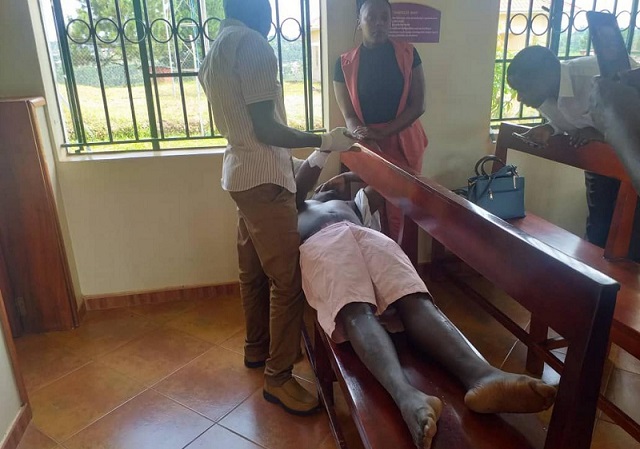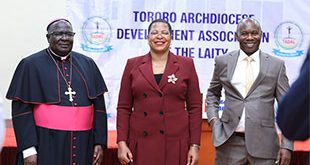
It is deeply disconcerting that mechanisms for holding government agents accountable are usually not effective in Uganda
COMMENT | EDWARD SERUCACA JNR | Amidst the fight against a new enemy, the coronavirus disease Covid-19, old foes are rearing their ugly heads. In mid-April, the Independent MP Francis Zaake of Mityana Municipality was wheeled into hospital struggling for his life.
He could hardly see and walk on his own and his body was awash with what seemed to be brazen injuries arising out of torture. Police had earlier picked Zaake from his house for distributing food to needy families in his constituency during the COVID-19 lockdown an act the police said went against a presidential directive. At the point of arrest, Zaake smiled and walked to the police car.
But by the time Zaake was arraigned before Mityana Magistrate court, he was a shadow of himself, visibly unaware on-going court proceedings. Days later the Minister of State for Internal Affairs, Mario Obiga Kania would to the floor of Parliament to blithely dismiss allegations the security forces tortured Zaake. He said Zaake had occasioned the injuries to himself.
Miles away in Iganga, Kakwenza Rukirabashaija, a political activist and author of, `The Greedy Barbarian’, a book that criticises the First family, was arrested on April 13, from his home, allegedly by the Chieftaincy of Military Intelligence (CMI). He was also presented in court days later reeling from injuries that pointed to foul play during custody.
Various cases of women, girls and children subjected to in-humane and degrading treatment over the past days by security agencies whilst enforcing presidential directives countrywide have come up. The resurgence of torture allegations in Uganda is indeed a worrying trend and erodes advances gained overtime in pushing back against the globally condemned vice.
The Convention Against Torture and other Cruel, Inhuman or Degrading Treatment or Punishment was adopted on December 10, 1984 and opened for ratification by General Assembly resolution 39/46. The underlying objective was total eradication of torture and effective functioning of the Convention Against Torture and other Cruel, Inhuman, Degrading Treatment or Punishment (CAT).
It was followed by the enactment of the United Nations Convention Against Torture (UNCAT) in 1987 which recognises freedom from torture not only as a human right but its violation as a crime. Uganda ratified the UNCAT in 1987, and domesticated it in 2012 by enacting the Prevention and Prohibition of Torture Act 2012 and Regulations thereunder in 2017.
Advocacy efforts in Uganda are hugely attributed to the NGO, African Centre for Treatment and Rehabilitation of Torture Victims (ACTV). Freedom from torture is not only a guaranteed human right that is absolute in nature but its violation is a crime in Uganda.
The continued incidents of torture reported in both the mainstream and online media platforms throughout the lockdown coupled with the near impossible process in bringing the alleged perpetrators to account should worry any right thinking Ugandan.
The discouraging end results from attempts to bring a few perpetrators to justice creates doubt as to the ability of the current response actions within the justice system to act as deterrent measures contemplated under Uganda’s legislative framework aimed at preventing torture.
To illustrate this, the six soldiers who brutalized residents at Elegu Border Post were sentenced to only six months in prison. The 10 police officers who allegedly tortured 38 victims in the same area were charged with aggravated torture.
Most recently, court awarded opposition politician Erias Lukwago who is the Lord Mayor of Kampala City and other suspects wrongfully arrested and subjected to sustained gruesome torture in the Late AIGP Kaweesi matter, Shs50 million and Shs360 million respectively but this monetary cost will be borne by the citizens.
There is no evidence to prove that torture is helpful in investigation and eventual prosecution of cases. In most cases information and evidence obtained through such means would in any case be deemed inadmissible in a Court of law.
Rather, torture results into immense costs for the citizen. This observation in itself should be enough to outweigh any tactical gain the perpetrators of acts of torture seek to make.
The mechanisms for holding government agents accountable are usually not effective in Uganda and the government seems to have no desire to make them so, despite a constitutional provision for government agents’ accountability. Nevertheless, parliament, the Ugandan Human Rights Commission, and the courts, among other institutions, must provide possibilities for putting pressure on the executive authorities to halt rights violations.
We must call on the state to illustrate its commitment to respecting the people’s right to freedom from torture and ill treatment and its agencies need to refrain from misinterpreting the directives of the President of the Republic of Uganda and the Ministry of Health guidelines as we fight the COVID 19 pandemic.
****
Edward Serucaca Jnr is the Advocacy and Networking Officer at the National Coalition of Human Rights Defenders
advocacy@hrdcoalition.ug+256-772-484-504
CLICK TO READ ONLINE MAGAZINE HERE
 The Independent Uganda: You get the Truth we Pay the Price
The Independent Uganda: You get the Truth we Pay the Price



